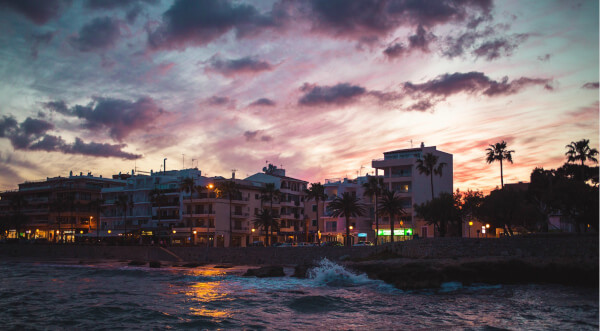The Spanish education system: An overview
One important decision, if you’re moving to Spain with family, is how to ensure that your children have the best possible education. As an expat family, you...

For the retiree dreaming of tapas and wine by the beach, there’s no better place than Spain. Whether you’re a Brit, an American or an Australian, you’ll find expatriates from your home country there. Retiring to Spain gives you nice weather and great health care, without having to worry about depleting your pension.The cost of living in Spain is extremely manageable.
International seniors in Spain have a robust and friendly community of fellow retirees. So what are you waiting for?
Spain operates on the Euro. It can be written in the currency exchange market as EUR or, as a currency symbol, you’ll see it precede prices with €. Because Spain uses the euro, it means that, as a retiree, you’ll be able to travel easily between other EU countries without having to worry about exchanging your money. The approximate equivalent of one euro as of the summer of 2017 are:
You can enjoy a comfortable standard of living in Spain for a reasonable cost. Here are some guidelines on what standard items cost:
| Item | Approximate cost in Spain |
|---|---|
| Carton of milk | 0.75 EUR |
| Loaf of bread | 0.95 EUR |
| Bottle of wine | 6 EUR |
| Monthly transport pass | 40 EUR |
| Meal for one at inexpensive restaurant | 10 EUR |
| Meal for two at mid-range restaurant | 35 EUR |
| Monthly rent, one-bedroom apartment | 500 EUR |
| Monthly rent, three-bedroom apartment | 800 EUR |
| Internet | 30 EUR |
| Basic utilities | 115 EUR |
If you find the need to transfer money from your account back home to a bank account in Spain, consider using Transferwise. They can save you money by offering the real mid market exchange rate and by saving you on fees by using local transfers to process your funds.
To retire on a modest salary in Spain, you might plan to spend around €17,000 a year. If you have €25,000 a year to use up, then that pretty much guarantees you can retire comfortably. If you’re willing to budget and live cheaply, as little as €15,000 yearly will do. Also, real estate prices have remained low ever since the 2007 financial crisis. So if you’re looking to buy property in Spain, now is still a good time to do it.
Weather-wise, living in Spain is a pretty ideal climate for retirees. The area around Barcelona, for example, has an average summer temperature of 24°C/ 74°F. In the coldest month, January, the average temperature is 10°C/ 49°F. Beachy areas like Malaga get down to around 13°C/55°F in the winter - not too bad.
The most densely-populated areas in Spain are Barcelona and Madrid. They are Spain’s two most famous cities and, incidentally, where most people live. Most people outside those areas tend to flock to places like Valencia, Seville and Zaragoza.
Spain offers retirees plenty of leisure activities - from food and wine to hiking, sport, beaching and nightlife. UNESCO World Heritage sites are all around Spain, so for history buffs looking to explore, there’s no shortage of destinations. Spain is known for its street culture. It’s very typical for friends to meet outside of the house for dinner, drinks and a chat. Senior expats can take advantage of this tradition by enjoying an active social life filled with meals and social gatherings.
The top five retirement areas in Spain are:
Granada is at the base of the Sierra Nevada mountains. It has snow sports in the winter and beachy weather in the summer.
Barcelona is located by the ocean, and is the second biggest city in Spain. You’ll find no shortage of festivals, art, architecture and probably the best nightlife in the country.
Madrid is the Spanish capital. In Madrid you’ll find all the cosmopolitan benefits of a global city, like history, culture and a modern infrastructure. There are world-famous museums and many parks and gardens, too.
Malaga is an old city on the Costa del Sol, which is a popular tourist destination. It’s known to be a safe and friendly place. You’ll find museums, shopping and restaurants galore, as well as summery weather all year round.
Valencia is a medieval city on the Mediterranean coast. It’s also one of Spain’s largest cities, and it’s known for having beautiful beaches and orange groves. No matter what your personality, you’ll probably find a nice home-away-from-home in Spain.
The UK government advises that most visits and stays in Spain are trouble-free no matter which city you pick. In Barcelona and Madrid you might run into the occasional pickpocket, since they’re such densely populated areas. However, in general these retirement cities tend to be on the safe side.
Visa and citizenship requirements are slightly different in Spain, depending on where you’re from.
If you happen to already have a work or residency visa from another EU country, sadly, it isn’t transferrable to Spain. To get a residency visa, you’ll need to apply for the visado de residencia from the Spanish consulate nearest to you before you travel to Spain. You’ll have to provide information that certifies that you’ll receive a regular pension, as well as proof of any other sources of income. If you happen to already own property in Spain, you’ll also need to be prepared to provide further details and paperwork.
Rules for residency visas for citizens of the United States may change slightly over time. However, in general you'd go through the same process as any other foreigner. You’ll apply for the visado de residencia from the embassy nearest your home. You’ll provide proof that you have enough income to support yourself while in Spain, and you also need to disclose your assets and liabilities. Then, it’s up to the Spanish authorities to grant you a visa. Application fees should be no more than $200.
As of 2017, the UK and Spain are still both members of the EU. Thus, the process for Brits applying to reside in Spain is still fairly simple. If you’re planning to stay for more than three months, register at the Oficina de Extranjeros in the province where you plan to live. You’ll then be issued a residence certificate. After five years of permanent registration, you’ll then need to apply for a certificate of permanent residency in Spain.
It’s no wonder that so many international people find post-career bliss in Spain. They can find low-cost homes by the sea, a variety of food and mild weather to enjoy. Also, wherever you land, you’re guaranteed to find fellow seniors to befriend. The Spanish government and people make it easy for expatriates to readjust to life in Spain.
Viva España!
*Please see terms of use and product availability for your region or visit Wise fees and pricing for the most up to date pricing and fee information.
This publication is provided for general information purposes and does not constitute legal, tax or other professional advice from Wise Payments Limited or its subsidiaries and its affiliates, and it is not intended as a substitute for obtaining advice from a financial advisor or any other professional.
We make no representations, warranties or guarantees, whether expressed or implied, that the content in the publication is accurate, complete or up to date.

One important decision, if you’re moving to Spain with family, is how to ensure that your children have the best possible education. As an expat family, you...

Keeping track of holidays in Spain can be an undertaking. The country only has a small handful of official, nationwide public holidays, but each region of...

Spain is a very popular expat destination. Every year, many people choose Spain as a perfect place to live, study, work or retire abroad. There’s a lot on...

With its incredible history, breathtaking views, welcoming locals, and distinctive cuisine, Spain can be a perfect destination for you and your fiancé(e) to...

Moving to a new country may be a huge undertaking, but there are a lot of great reasons to do it. Whether you’re starting a new job, studying abroad,...

The idea of living in Spain is a dream of many; zipping along the southern coast, stopping for paella and a sip of wine, enjoying Gaudi’s surreal architecture...